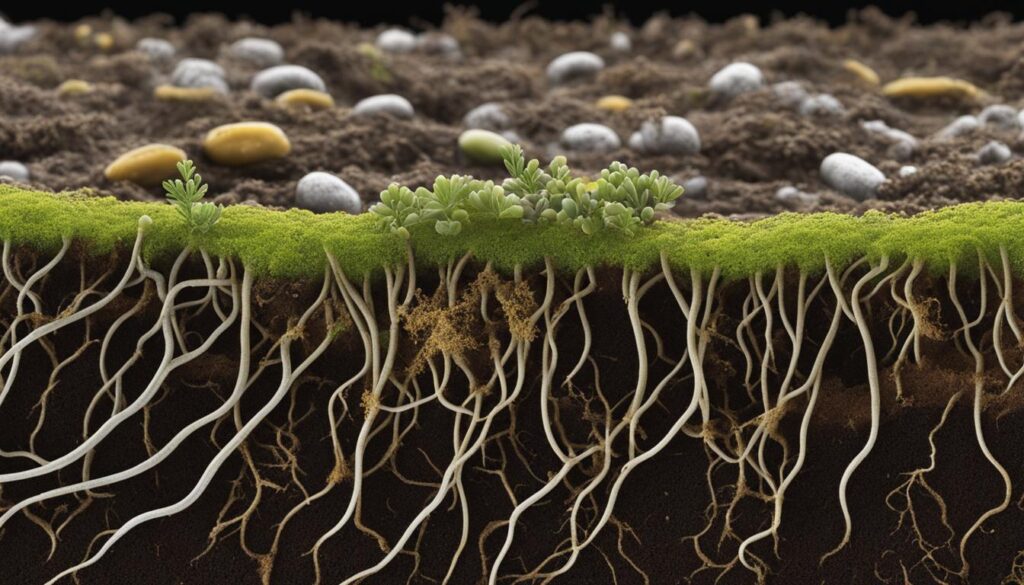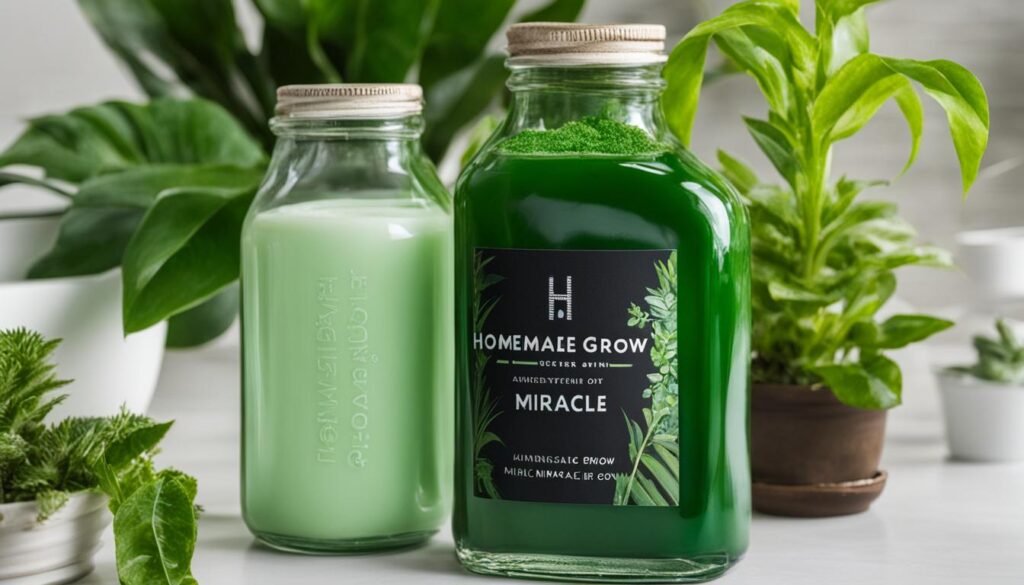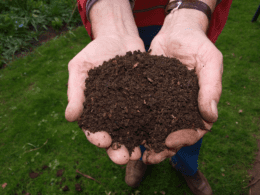When it comes to fertilizing your garden, you have alternatives to synthetic fertilizers like Miracle Gro. Organic fertilizers can provide effective and sustainable options for promoting healthy plant growth. By choosing organic fertilizers, you can feed the soil, nourish beneficial organisms, and provide essential nutrients to your plants.
Unlike synthetic fertilizers, which may offer a quick boost but can harm the soil and lack vital nutrients, organic fertilizers offer a complete and natural source of nourishment for your plants. Options such as compost, worm castings, animal waste, and fish emulsion can help support healthy root development, lush foliage, and thriving blooms.
If you’re looking for alternatives to Miracle Gro, consider options like Neptune’s Harvest Fish Emulsion or Fish-Seaweed Blend. These organic fertilizers provide a rich blend of nutrients derived from fresh North Atlantic fish, including essential vitamins, micro and macro nutrients, amino acids, and natural growth hormones. By choosing organic fertilizers, you can promote a balanced ecosystem and support the long-term health of your garden.
Post Summary
- Organic fertilizers like compost, worm castings, and fish emulsion offer effective alternatives to synthetic fertilizers like Miracle Gro.
- Choosing organic fertilizers ensures the soil is nourished, beneficial organisms thrive, and plants receive essential nutrients.
- Neptune’s Harvest Fish Emulsion and Fish-Seaweed Blend provide a complete source of nutrients for healthy plant growth.
- Organic fertilizers promote a balanced ecosystem and support the long-term health of your garden.
- Consider organic options for a more sustainable approach to gardening.
The Drawbacks of Synthetic Fertilizers
Synthetic fertilizers like Miracle Gro may provide a quick burst of growth, but they come with several drawbacks. One major concern is their impact on the soil. Synthetic fertilizers do not nourish the soil like organic fertilizers do. Instead, they directly feed the plants, which can lead to long-term soil degradation.
Certain synthetic fertilizers, such as those containing Ammonium Phosphate, can be particularly harmful to the soil. They have the potential to acidify the soil and harm beneficial soil organisms. These fertilizers may also encourage excessive leaf growth at the expense of fruit production. Furthermore, synthetic fertilizers often lack essential nutrients and trace elements that can be found in organic matter.
“Synthetic fertilizers do not nourish the soil like organic fertilizers do.”
Choosing synthetic fertilizers can have implications beyond soil health. The chemicals in these fertilizers can leach into water sources, posing a threat to nearby aquatic life. Additionally, continuous use of synthetic fertilizers can lead to nutrient imbalances in the soil, making it difficult for plants to thrive without constant supplementation.
Environmental Impact of Synthetic Fertilizers
The use of synthetic fertilizers raises concerns about sustainability and environmental impact. The production of these fertilizers relies heavily on fossil fuels, contributing to carbon emissions and climate change. The excessive use of synthetic fertilizers can also result in nutrient runoff, leading to water pollution and the formation of harmful algal blooms.
| Drawbacks of Synthetic Fertilizers | Impact |
|---|---|
| Do not nourish the soil | Can lead to long-term soil degradation |
| Acidify the soil | Harmful to beneficial soil organisms |
| Encourage excessive leaf growth | At the expense of fruit production |
| Lack essential nutrients | May result in nutrient imbalances |
| Potential water pollution | Leaching into water sources |
| Environmental impact | Contribution to climate change and algal blooms |
Considering the drawbacks of synthetic fertilizers, it is worth exploring alternative options that can provide a more balanced and sustainable approach to garden fertilization.
Organic Fertilizers for Healthy Soil
When it comes to promoting healthy soil and providing essential nutrients for your plants, organic fertilizers are the way to go. One highly recommended option is Neptune’s Harvest Fish Emulsion. Made from fresh North Atlantic fish, this organic fertilizer is packed with nutrients such as nitrogen, phosphorus, and potassium, as well as micro and macro nutrients, amino acids, and natural growth hormones.
Another great choice is the Fish-Seaweed Blend, which combines the benefits of fish emulsion with seaweed extract. This blend not only provides essential nutrients for plant growth but also contains natural trace elements that support overall soil health. Both Neptune’s Harvest products are derived from sustainable sources and are safe to use around children and pets.
Studies have shown that organic fertilizers like Neptune’s Harvest can outperform chemical fertilizers in terms of plant growth and overall soil health. By nourishing the soil and promoting a healthy ecosystem, these organic fertilizers help plants establish strong root systems and resist pests and diseases more effectively.
Benefits of Organic Fertilizers:
- Provide essential nutrients for plant growth
- Nourish the soil and support a healthy ecosystem
- Promote strong root systems and resistance to pests and diseases
- Derived from sustainable sources and safe for children and pets
Comparison of Neptune’s Harvest Fish Emulsion and Fish-Seaweed Blend:
| Fertilizer | Nutrient Content | Additional Benefits |
|---|---|---|
| Neptune’s Harvest Fish Emulsion | Rich in nitrogen, phosphorus, potassium, micro and macro nutrients, amino acids, and natural growth hormones | Promotes healthy plant growth and overall soil health |
| Fish-Seaweed Blend | Combines fish emulsion with seaweed extract for a balanced nutrient profile | Provides trace elements and supports soil health |
Using organic fertilizers like Neptune’s Harvest Fish Emulsion and Fish-Seaweed Blend not only nourishes your plants but also helps build a sustainable garden ecosystem. By choosing organic options, you are making a conscious effort to minimize the use of synthetic chemicals and support the long-term health of your soil and plants.
By incorporating organic fertilizers into your gardening routine, you can create a thriving garden while promoting environmental sustainability. Whether you choose Neptune’s Harvest Fish Emulsion, the Fish-Seaweed Blend, or other organic fertilizers, you’ll be providing your plants with the essential nutrients they need to grow strong and healthy.
Now that you know the benefits of organic fertilizers for healthy soil, you can make informed choices when it comes to nourishing your garden. Say goodbye to synthetic fertilizers and embrace the natural power of organic alternatives like Neptune’s Harvest Fish Emulsion and Fish-Seaweed Blend.
Beneficial Bacteria for Nutrient Absorption
When it comes to enhancing nutrient absorption in plants, incorporating beneficial bacteria into your soil management program can make a significant difference. Products like Photosynthesis Plus and Vegetable & Fruit Yield Enhancer contain photosynthetic bacteria that fix nitrogen from the atmosphere, providing natural fertilization to plants. These beneficial microbes not only improve photosynthesis but also help plants absorb available nutrients, trace minerals, and essential elements more effectively. By improving nutrient absorption, these products contribute to healthier plants with larger root systems and increased overall yield.
One of the key benefits of using beneficial bacteria is their ability to fix nitrogen from the atmosphere. Nitrogen is an essential nutrient for plant growth, and when plants can access it more efficiently, they can achieve optimal development. Additionally, these bacteria enhance photosynthesis, which is crucial for the production of energy and the synthesis of carbohydrates that fuel plant growth. With improved photosynthesis, plants can accumulate more energy and nutrients, resulting in healthier and more vigorous growth.
By promoting nutrient absorption, beneficial bacteria can also support higher yields and improved crop quality. Plants that can efficiently take up nutrients experience less stress, have better disease resistance, and produce larger, more flavorful fruits and vegetables. This is especially important for commercial growers who rely on high-quality and high-yield crops for their business.
Overall, incorporating beneficial bacteria into your soil management program is a sustainable and effective way to enhance nutrient absorption in plants. By utilizing products like Photosynthesis Plus and Vegetable & Fruit Yield Enhancer, you can improve the overall health and productivity of your garden or farm. These products contain the necessary bacteria to maximize nutrient absorption, resulting in healthier plants, higher yields, and better crop quality.
Alternative Fertilizers for Different Plant Needs
When it comes to fertilizing your garden, it’s essential to choose the right fertilizer for your specific plant needs. Different plants have different nutrient requirements, and using alternative fertilizers can provide targeted nutrition to support their growth and development. Here are some alternative fertilizers that cater to specific plant needs:
Scotts Turf Builder Lawn Food
If you have a lawn that needs some extra care, Scotts Turf Builder Lawn Food is a great option. This fertilizer is specially formulated to promote healthy and green lawns. It contains essential nutrients like nitrogen, phosphorus, and potassium, which are crucial for grass growth. With regular application, Scotts Turf Builder Lawn Food can help your lawn thrive and maintain its vibrant appearance.
Jobe’s Organic Flower & Rose Granular Fertilizer
For those who have flowering plants and roses in their garden, Jobe’s Organic Flower & Rose Granular Fertilizer is an ideal choice. This organic fertilizer is specifically formulated to provide essential nutrients for healthy flower and rose growth. It contains a balanced blend of macro and micronutrients, along with beneficial bacteria and fungi that promote strong root development and vibrant blooms.
HastaGro
If you’re looking for a versatile fertilizer that can be used on various plants, HastaGro is an excellent option. This liquid fertilizer is ideal for foliar application and can be used on a wide range of plants, including vegetables, fruits, flowers, and ornamentals. HastaGro helps build biological activity in the soil, promoting healthy plant growth and increased fruiting and blooming. It also aids in transplant success, making it a valuable addition to any garden.
| Fertilizer | Plant Type | Key Benefits |
|---|---|---|
| Scotts Turf Builder Lawn Food | Lawn | Promotes healthy and green lawns |
| Jobe’s Organic Flower & Rose Granular Fertilizer | Flowering plants, roses | Supports vibrant blooms and healthy growth |
| HastaGro | Various plants | Builds biological activity, promotes fruiting, blooming, and transplant success |
Choosing the right fertilizer for your plants can make a significant difference in their overall health and productivity. By opting for alternative fertilizers like Scotts Turf Builder Lawn Food, Jobe’s Organic Flower & Rose Granular Fertilizer, and HastaGro, you can provide targeted nutrition and support specific plant needs. Whether you have a lawn, flowering plants, or a variety of plants in your garden, these alternative fertilizers can help you achieve the best results.
Jacks Prof 77010 General Purpose Fertilizer
Jacks Prof 77010 General Purpose Fertilizer is a versatile option for maintaining various types of plants. Its balanced nutrient formulation helps promote healthy leaf and root growth, allowing plants to thrive. With a high amount of nitrogen, phosphorus, and potassium, this fertilizer supports overall plant development. It can be easily applied by mixing with water and watering onto the plants, making it a convenient choice for both indoor and outdoor gardening.
When it comes to providing the necessary nutrients for your plants, Jacks Prof 77010 General Purpose Fertilizer offers a well-rounded solution. This general purpose fertilizer is specially formulated to meet the nutritional needs of a variety of plants, from flowers to vegetables and everything in between. Its balanced nutrient formulation ensures that your plants receive the essential elements they need for healthy growth and development.
One of the key benefits of using Jacks Prof 77010 General Purpose Fertilizer is its high amount of nitrogen, phosphorus, and potassium. These primary nutrients play a crucial role in supporting plant growth, from promoting strong root systems to encouraging vibrant foliage. By providing your plants with the right balance of these essential elements, you can help ensure that they have the foundation they need to flourish.
Another advantage of Jacks Prof 77010 General Purpose Fertilizer is its ease of use. Simply mix the fertilizer with water according to the package instructions and apply it to your plants either by watering onto the soil or through foliar application. This makes it a convenient choice for both beginners and experienced gardeners alike, as it eliminates the guesswork associated with measuring and applying fertilizers.
AgroThrive All-Purpose Organic Liquid Fertilizer
Experience fast plant growth and higher yields with AgroThrive All-Purpose Organic Liquid Fertilizer. This highly effective fertilizer is designed to work on any plant and delivers impressive results. With its easy-to-use liquid formula, you can promote root stimulation and ensure the health and vitality of your plants.
AgroThrive All-Purpose Organic Liquid Fertilizer: the secret to faster plant growth and better yields.
AgroThrive is formulated to provide the essential nutrients your plants need for optimal growth. Its carefully balanced blend of organic ingredients supports healthy root development, leading to stronger and more productive plants. You’ll be amazed at the difference this organic liquid fertilizer can make in your garden.
What sets AgroThrive apart is its commitment to organic and sustainable practices. This all-purpose fertilizer is made from high-quality organic materials that are safe for your plants, your family, and the environment. You can use it with peace of mind, knowing that you’re nourishing your garden without the use of synthetic chemicals.
| Benefits of AgroThrive All-Purpose Organic Liquid Fertilizer |
|---|
| Faster plant growth |
| Higher yields |
| Easy to use |
| Promotes root stimulation |
| Safe for home use |
| Environmentally friendly |
Don’t settle for sluggish plant growth and disappointing yields. Give your garden the boost it needs with AgroThrive All-Purpose Organic Liquid Fertilizer. Experience the power of organic gardening and enjoy a bountiful harvest.
Testimonials
“AgroThrive has completely transformed my garden. My plants are thriving, and the yields are better than ever before. I highly recommend this organic liquid fertilizer to any gardener looking for impressive results.” – Jane, enthusiastic gardener.
“I’ve tried many fertilizers in the past, but AgroThrive is by far the best. It’s easy to use, and my plants are growing like never before. I’m amazed at the difference it has made in my garden.” – Mark, passionate plant lover.
Homemade Miracle Grow: Create Your Own Natural Fertilizer
If you prefer a natural approach to fertilizing your garden, you can easily create your own homemade Miracle Grow using common household items. This DIY fertilizer provides essential nutrients for healthy plant growth and can be a sustainable choice for your garden.
To make your homemade Miracle Grow, you’ll need a few ingredients including Epsom salt, baking soda, household ammonia, and water. These ingredients can be easily found in your kitchen or local store. Simply mix them together in the right proportions and apply the mixture to the soil around your plants once a month. This homemade plant food will provide a complete source of nutrients for your plants without the use of synthetic chemicals.
Homemade Miracle Grow is a cost-effective way to nourish your plants and promote healthy growth. It can be especially beneficial for organic gardeners who want to avoid the use of synthetic fertilizers. By using natural ingredients, you can ensure that your plants receive the essential nutrients they need while minimizing the impact on the environment.
| Ingredients | Quantity |
|---|---|
| Epsom salt | 1 tablespoon |
| Baking soda | 1 teaspoon |
| Household ammonia | 1 tablespoon |
| Water | 1 gallon |
Using homemade Miracle Grow can provide your plants with the necessary nutrients for healthy growth. It’s important to note that this homemade fertilizer should be used in moderation to avoid over-fertilization. Always follow the recommended application guidelines and monitor your plants’ response to ensure optimal results.
With homemade Miracle Grow, you can take control of your garden’s nutrient supply and promote a thriving ecosystem. Give it a try and see the difference it can make in the health and vitality of your plants.
Animal Manure for Soil Nutrition
When it comes to providing essential nutrients for your plants and improving soil health, animal manure can be an excellent choice. Animal manure is rich in primary nutrients such as nitrogen, phosphorus, and potassium, making it a valuable source of plant nutrition. Additionally, it contains micronutrients that are essential for plant growth and development.
Using composted animal manure in your garden helps improve soil structure and fertility. Composting animal manure breaks it down into a stable form, making it easier for plants to absorb the nutrients. It also helps increase soil organic matter, which promotes microbial activity and enhances the overall health of your soil.
When using animal manure as a fertilizer, it’s important to compost it properly to ensure its safety and effectiveness. Composting involves creating a pile of manure mixed with other organic materials such as yard waste, straw, or leaves. The compost pile should be turned regularly to provide oxygen and promote decomposition. After the composting process is complete, the manure can be used as a nutrient-rich amendment for your soil, providing slow-release nutrients over time.
It’s worth noting that not all animal manure is suitable for garden use. Herbivore manure, such as cow, sheep, and chicken manure, is safest and most commonly used. Avoid using manure from carnivorous animals or pets, as it may contain harmful pathogens or chemicals.
Benefits of Using Animal Manure in the Garden
When properly composted and applied, animal manure offers several benefits for your garden:
- Supplies primary nutrients: Animal manure is a rich source of nitrogen, phosphorus, and potassium, which are essential for plant growth.
- Improves soil structure: Composted manure helps improve soil texture, drainage, and water-holding capacity.
- Promotes beneficial soil organisms: It fosters the growth of beneficial bacteria, fungi, and earthworms, which contribute to a healthy soil ecosystem.
- Increases water-holding capacity: The organic matter in manure helps improve the soil’s ability to retain water, reducing the need for frequent watering.
- Provides slow-release nutrients: Composted manure releases nutrients slowly over time, providing a steady supply of nutrition to plants.
Overall, animal manure can be a sustainable and nutrient-rich option for improving soil fertility and promoting healthy plant growth in your garden.
Coffee Grounds for Acidic Soil
If you’re looking for a natural and nutrient-rich alternative to Miracle Gro, coffee grounds can be a great option, especially for plants that thrive in acidic soil. Coffee grounds are naturally acidic and contain essential minerals like nitrogen, magnesium, and potassium that can help promote healthy growth and provide necessary nutrients for your plants. One of the perks of using coffee grounds as a fertilizer is that they are readily available and can be easily obtained from your daily coffee brewing routine.
To use coffee grounds in your garden, simply sprinkle the grounds around the base of your plants and incorporate them into the soil. They can be particularly beneficial for acid-loving plants like azaleas, tomatoes, blueberries, roses, and rhododendrons. Coffee grounds not only help acidify the soil but also improve its structure and water retention capacity.
“Coffee grounds can help acidify the soil and provide essential minerals for plant growth.”
It’s important to note that while coffee grounds can be beneficial for plants, they should be used in moderation. Excessive amounts of coffee grounds can potentially create an overly acidic environment, which may harm some plants. It’s best to mix the coffee grounds with other organic matter, such as compost, to create a balanced nutrient-rich soil mixture.
Benefits of Using Coffee Grounds as Fertilizer:
- Acidifies the soil
- Provides essential minerals like nitrogen, magnesium, and potassium
- Improves soil structure and water retention
- Readily available and easy to obtain
| Plant | Recommended Use of Coffee Grounds |
|---|---|
| Azaleas | Mix coffee grounds with soil for improved acidity and nutrient supply. |
| Tomatoes | Incorporate coffee grounds into the planting hole to provide necessary nutrients. |
| Blueberries | Spread coffee grounds around the base of the plants to maintain acidic soil conditions. |
| Roses | Add coffee grounds to the soil to enhance nutrient availability and promote healthy growth. |
| Rhododendrons | Apply coffee grounds as a mulch around the plants to improve soil acidity and fertility. |
Using coffee grounds as a natural fertilizer for your garden not only helps reduce waste but also provides a sustainable and cost-effective way to nourish your plants. Give it a try and see the benefits firsthand!
Eggshells for Calcium-Rich Soil
When it comes to providing essential nutrients for your plants, eggshells can be a valuable and sustainable option. Eggshells are rich in calcium, which is essential for strong cellular structures and healthy plant growth. By incorporating eggshells into your gardening practices, you can amend your soil with calcium carbonate, benefiting a wide range of plants.
To use eggshells in your garden, start by collecting and washing the shells from eggs you use in your kitchen. Once the shells are clean and dry, crush them into small pieces. Sprinkle the crushed eggshells around the base of your plants and gently incorporate them into the soil. This natural soil amendment will release calcium carbonate over time, helping to raise the pH of the soil and provide a steady supply of calcium for your plants.
Eggshells can be particularly beneficial for plants that require higher levels of calcium, such as tomatoes, peppers, and squash. These plants are prone to calcium deficiency, which can lead to blossom end rot and stunted growth. By adding eggshells to the soil, you can help prevent these issues and promote healthy plant development.
Using eggshells as a soil amendment is a sustainable and cost-effective way to provide calcium to your plants. By reusing a kitchen waste product, you can reduce waste and give your plants the nutrients they need to thrive.
Post Summary
- Eggshells are a valuable source of calcium for plants.
- Crushed eggshells can be sprinkled around the base of plants and incorporated into the soil.
- Eggshell amendments release calcium carbonate, raise soil pH, and provide long-term calcium nutrition.
- Plants like tomatoes, peppers, and squash can benefit from the calcium-rich properties of eggshells.
- Using eggshells in your garden is a sustainable way to provide essential nutrients to your plants.
Conclusion
When it comes to fertilizing your garden, there are many alternatives to Miracle Gro that can provide a more sustainable approach. By choosing organic fertilizers and natural alternatives, you can promote healthy soil and plant growth while minimizing the use of synthetic chemicals.
Organic fertilizers like Neptune’s Harvest Fish Emulsion or Fish-Seaweed Blend offer a complete and natural source of nutrients for your plants. These products nourish the soil and support a healthy ecosystem, resulting in improved plant growth and overall soil health.
Additionally, there are alternative fertilizers available for different types of plants. Scotts Turf Builder Lawn Food is ideal for promoting healthy and green lawns, while Jobe’s Organic Flower & Rose Granular Fertilizer is formulated specifically for flowering plants and roses. HastaGro is a great option for foliar application and can enhance fruiting, blooming, and transplant success.
By exploring these Miracle Gro alternatives and incorporating them into your garden maintenance routine, you can create a thriving garden that is both environmentally friendly and beneficial for your plants.
What Are Some Organic Fertilizers I Can Use for Aeroponics or Hydroponics Farming?
When considering organic fertilizers for aeroponics or hydroponics farming, it’s important to understand the differences and benefits of soilless farming. Options like seaweed extract, fish emulsion, and compost tea can provide essential nutrients without the use of soil. These organic fertilizers can enhance plant growth and yield in a soilless farming environment.
FAQ
Are organic fertilizers as effective as synthetic fertilizers like Miracle Gro?
Yes, organic fertilizers can be just as effective in promoting healthy plant growth. They provide a complete and natural source of nutrients for your plants and nourish the soil, unlike synthetic fertilizers.
What are the drawbacks of synthetic fertilizers?
Synthetic fertilizers can harm the soil and lack essential nutrients. They may acidify the soil, harm soil organisms, and encourage excessive leaf growth at the expense of fruit production.
What are some organic fertilizers for healthy soil?
Organic fertilizers like Neptune’s Harvest Fish Emulsion and Fish-Seaweed Blend provide essential nutrients and promote healthy soil and plant growth.
How do beneficial bacteria enhance nutrient absorption?
Beneficial bacteria products like Photosynthesis Plus and Vegetable & Fruit Yield Enhancer improve nutrient absorption in plants, leading to healthier plants with larger root systems and increased yield.
What are some alternative fertilizers for different plant needs?
Scotts Turf Builder Lawn Food, Jobe’s Organic Flower & Rose Granular Fertilizer, and HastaGro are examples of alternative fertilizers that cater to specific plant needs.
What is Jacks Prof 77010 General Purpose Fertilizer used for?
Jacks Prof 77010 is a versatile fertilizer that promotes healthy leaf and root growth in various types of plants.
How does AgroThrive All-Purpose Organic Liquid Fertilizer work?
AgroThrive All-Purpose Organic Liquid Fertilizer provides fast growth and higher yields by stimulating root development in plants.
Can I make my own homemade Miracle Grow?
Yes, you can create a homemade Miracle Grow using ingredients like Epsom salt, baking soda, and household ammonia mixed with water.
How can animal manure benefit soil?
Animal manure, when properly composted, is a valuable source of nutrients that improves soil structure, promotes beneficial soil organisms, and provides slow-release nutrients.
Are coffee grounds a good alternative to Miracle Gro?
Yes, coffee grounds can be used as a natural fertilizer, especially for plants that thrive in acidic soil. They provide essential nutrients and help acidify the soil.
How can eggshells benefit the soil?
Crushed eggshells, when applied to the soil, release calcium carbonate, which raises soil pH and provides plants with necessary calcium for healthy growth.
What are the advantages of choosing Miracle Gro alternatives?
By opting for Miracle Gro alternatives, you can create a thriving garden while minimizing the use of synthetic chemicals. Organic fertilizers and natural alternatives offer a more sustainable approach to gardening.













